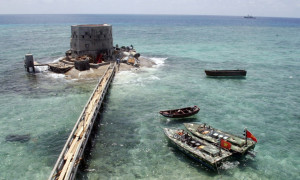
China is continuing its expansion in the Spratly Islands. And if earlier it was capturing individual islands or even reefs, today dozens of Chinese vessels pour out tons of sand, stones and soil there every day thereby visibly asserting China’s presence in this region of the world. At the same time, no protests from neighbours and especially the Philippines and Vietnam and the ASEAN countries in general are not taken into consideration.
In this situation, the United States has new opportunities to enhance its presence in the region. The fact is that, in the search for allies, some of China’s neighbours believe that the US is the only force capable of restoring the balance of power in the South China Sea.
In turn, the Americans, within their declared strategy of returning to Asia, seek every possible way to demonstrate their military and political possibilities and determination to oppose Chinese actions in the region. The combination of these two factors – the continuing expansion of China and the desire of the US to demonstrate its ability to oppose it – creates an extremely dangerous situation for peace and stability in the region. The Americans are trying to build up the anti-Chinese front using the neighbours of China and to draw the countries of the South China Sea into a real conflict with Beijing.
On the other hand, in response to these actions China is only toughening its rhetoric and is moving further away from the way of solving existing conflicts through negotiations and mutual compromises.
It is likely that China would conduct a different policy and take into account the interests of its historic neighbours and partners under the pressure of the international community and on the basis of international law, in particular on the basis of the UN Law of the Sea Convention of1982 but fort such an active American presence in the conflict over the islands in the South China Sea.
And as it is, the construction of China’s unsinkable aircraft carriers in the form of military bases on artificial islands is now in full swing. The construction of the first runway has been completed on Fiery Cross Reef in the Spratly Archipelago, a similar runway is almost ready for operation in the area of Subi Reef, the preparatory work is being performed for the construction of a runway and berths for ships in the area of Mischif Reef near the Philippine island of Palavang. Photos taken over the islands show that the lagoon is literally jammed with Chinese ships that bring sand there, and thus the obscure reef, that used to sink into water at high tide, has turned into a full-fledged island, and one of the largest islands in the South China Sea.
What will happen after the completion of this construction has been demonstrated recently by the first test flight of Chinese civil aircraft that landed at the airport on Fiery Cross Reef for the first time in history. By the way, not only the airport but also a sea port capable of receiving large ships has been built there. Landing if civil aircraft indicates that the Chinese Air Force has eliminated its major weak point in the region – remoteness of bases from the Spratlys Island. Now they will be able to control almost the entire perimeter of the so-called nine dash line which is considered by China as its border in the South China Sea. This line covers almost 2.2 million sq. kilometres, or 80% of the total water area of this sea.
The extension of the area of islands, construction of facilities here that can easily be transformed into military bases cannot but cause concern and regret, but the threat of an explosion and serious conflict lies in the fact that the threat of a military confrontation between China and the United States is continuously growing in the existing circumstances. Having transformed the former reefs into artificial islands, China claims the right to the 12 mile zone around them that would be forbidden for ships of other countries. In response, neither ASEAN nor, more significantly, the United States recognize China’s claims and say they are considering all these artificial islands as reefs and, accordingly, the waters around them as international waters..
Here it is – the field of conflict has already been filled with dangerous incidents. Just like as it was the case with the American aircraft that flew over the artificial islands despite all the warnings of the Chinese. Or it is even more dangerous mission that was performed by the US destroyer Lassen in late October. Despite all the protests of China, it sailed near the Chinese airport and the berths on Subi Reef. Chinese warships that pursued it could open fire at any moment, which could blow up the fragile peace on the Spratly Islands.
Another problem is that, according to the United States, the cruise of Lassen was not a single event. It was part of a long-term program for supporting freedom of navigation. So we can expect that soon either this destroyer or another US Navy ship will sail the same dangerous route again. And there is no guarantee that everything will go as smoothly as it did the first time.
Dmitry Mosyakov, Professor, Doctor of Historical Sciences, Director of the Centre for Southeast Asia, Australia and Oceania and the Institute of Oriental Studies of the Russian Academy of Sciences, exclusively for the online magazine “New Eastern Outlook.“
